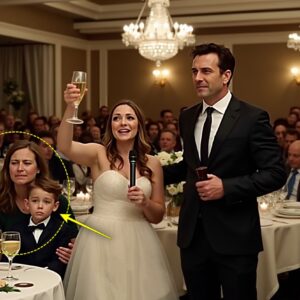I’ve been in a relationship with Amira for just over a year now. She possesses intelligence, compassion, and stability—truly a wonderful individual. She’s the type of person you envision sharing your future with. I asked her to marry me last month, and she accepted. Tears flowed from both of us. It seemed like everything was falling into place.
However… I had yet to inform my parents.
I wasn’t concealing her out of embarrassment. I simply anticipated their response. My parents come from a rural area with traditional viewpoints, and unfortunately—racial issues have always created underlying tensions. My mother particularly. She maintains a smile while delivering subtle insults.
When I finally informed them about Amira—and our engagement—my mother’s expression became rigid. Completely motionless.
“What is her heritage?” she questioned.
I understood her actual meaning.
“She’s Black,” I replied. “Her family resides in Maryland. She works as a teacher.”
Complete quiet followed. An uncomfortable, tense silence.
Then my father said, “Son, are you certain? You’ve only lived there for a few years. Perhaps you’re making hasty decisions…”
As for my mother? She simply moved her head side to side and stated, “Not her. Please reconsider this.”
That summarized it. “Not her.”
She never inquired about Amira’s character, principles, or what brings her joy. She immediately rejected the idea.
Now they ignore my messages. I haven’t told Amira about that conversation. She constantly asks when she’ll meet them. She creates Pinterest boards for wedding ideas. I continue to avoid the subject.
Tonight I received a message from my mother. A single sentence.
“If you marry her, don’t expect us to attend.”
I gazed at my phone for an extended period after reading that text. The message blurred and rearranged in my thoughts, generating feelings of rage, guilt, and sorrow simultaneously. I turned off the screen. Then reactivated it to examine the message again, hoping my mother might have written something different upon second inspection. No such fortune.
I remained awake throughout the night, my mind cycling through terrible possibilities. At times I nearly called my mother, wanting to yell at her. Other moments, I considered blocking her number permanently. Mostly, I imagined how hurt Amira would feel knowing the truth: my parents rejected her because of her race.
By dawn, I had barely rested. A faint pain throbbed behind my eyes. Amira clearly noticed something was wrong, as she suggested we stroll through our local park that afternoon. The late winter air remained slightly cold, so she wrapped a thick scarf around her neck and linked her arm with mine.
We walked silently for some time. The wind shook the empty branches above, reminding me of the quietness between my family and me. After a while, she gently squeezed my arm.
“Is everything alright?” she inquired, her eyes unwavering. “I sense something has been troubling you.”
I tried to speak, but couldn’t form the words. The anxiety about losing her and confronting my parents battled within my mind. Eventually, I exhaled and admitted, “I spoke to my parents about our relationship. They…didn’t respond well.”
Her body tensed slightly, her grip tightening on my arm. “Because of my race?”
The question was direct, but honesty was necessary. “Yes,” I murmured. “They’re refusing to attend our wedding.”
Pain crossed Amira’s face. Tears appeared ready to form in her eyes, but she inhaled slowly and forced a melancholy smile. “I wish this was unexpected,” she said quietly. “But sometimes you anticipate these reactions.”
I agreed, feeling guilt burn inside me. This was the woman I adored, whom I’d asked to share my life. Yet my parents only saw her skin color and some outdated beliefs about what was ‘appropriate.’ The injustice was overwhelming.
We continued walking, then she spoke again with gentleness yet firmness. “I love you. But I need to understand if this will become an obstacle. I don’t want a husband who might blame me later because his family disapproves.”
I halted and looked directly at her. “I swear,” I said with emotional intensity. “I will never blame you. You are my family—my future. If my parents can’t accept this reality, that’s their issue. I’m just…trying to determine our next steps.”
She acknowledged this, taking my hand. “We’ll solve this together. But you must be completely truthful with me about everything, agreed?”
I vowed I would.
During the following weeks, we attempted to resume normal life—arranging wedding details, consulting with a photographer friend about engagement pictures, and exploring possible venues. However, whenever guest list discussions arose, I felt sick. My parents still ignored my calls, and our wedding date approached quickly.
I considered postponing the ceremony until reconciling with my family. Yet each time I contemplated delay, it seemed like surrendering too much control over our relationship to them. Amira recognized my internal struggle and offered different perspectives. She proposed inviting them to a simple dinner at a neutral location, allowing them to properly meet her. Alternatively, she suggested involving my older cousin, Raoul—who held more progressive views—to possibly reason with them.
I followed her suggestion. I phoned Raoul and explained the situation completely. He released a breath and remarked, “I always recognized your parents had strong beliefs, but I never thought they would react this extremely. Let me attempt to speak with them. They certainly have prejudices, but their love for you runs deep.”
Several days later, Raoul contacted me again. His efforts to reason with my parents had failed entirely. He informed me, “Your mother expressed some very cruel comments about you ‘rejecting your heritage.’ I tried explaining that love transcends barriers, and society has progressed, but she refused to listen. Your father barely participated, though he showed no disagreement with her.”
I expressed gratitude to Raoul for his attempt. After ending the call, I walked restlessly around our living room. When Amira entered, she discovered me nearly creating a track in the floor. Silently, she embraced me around my waist and placed her head against my chest. “I remain by your side,” she whispered.
I embraced her, allowing her body’s warmth to soothe me. “I’ve exhausted all options,” I confessed. “I’ve called repeatedly. I’ve sent numerous texts. Raoul tried convincing them. They seem firmly decided.”
She gazed up at me, her eyes resolute. “What does this mean for us?”
I hesitated, then said quietly, “We continue forward. Regardless of their participation.”
Amira took a deep breath and agreed. “Very well. Let’s proceed.”
Approximately one month later, we stood before a small rented venue for our ceremony. The location wasn’t large or elaborate, but possessed an intimate appeal—exposed wooden beams crossed the ceiling, soft lighting filled the space, and a garden behind the building showed early spring blooms. About fifty attendees joined us, primarily our friends and several members of Amira’s family, alongside my cousin Raoul and a few open-minded relatives from my family who rejected outdated prejudices.
While standing at the altar, I repeatedly glanced toward the entrance, simultaneously hoping yet fearing my parents might arrive at the last moment. The officiant gave me occasional nods as if asking, “Are you well?” I managed a forced smile, though my heart raced. I noticed Raoul in the front row also periodically checking the doors.
Finally, the music began, and Amira appeared, escorted by her father. She looked stunning—wearing a dress both simple and refined, her eyes glowing with happiness that touched my heart deeply. I realized then that this represented my true family. Right here. My parents’ actions remained beyond my influence.
She reached my side, we joined hands, and the ceremony commenced. We recited personally written vows—promises about trust, respect, and creating a loving life that overcomes any prejudiced barriers. Several guests sniffled audibly. Even my eyes filled with tears.
When the officiant declared, “I now pronounce you husband and wife,” an overwhelming surge of feeling hit me so powerfully I nearly fainted. Our lips met, and the crowd erupted in applause. For a brief moment, I permitted myself one final look at the entrance, hoping to spot my parents there. But the doors remained shut.
During the celebration, we moved to music, shared laughter, and stood for countless photographs. Guests offered congratulations, commenting on Amira’s beauty and the moving nature of our promises. I felt thankful for every individual who attended. These people truly mattered.
As the evening concluded, my phone vibrated. I had placed it in my jacket and almost forgotten its presence. I stepped away from the gathering to view the message. My father had written: “Heard you got married. Hope you’re happy.”
Nothing more. No well-wishes, no regrets, no mention of visiting me. Strangely, I felt no distress. Instead, a peculiar sense of comfort washed over me. At minimum, he had made contact, however lukewarm the gesture.
I responded, “We are. She’s wonderful. I love you, Dad.” Then I stowed my phone away. I anticipated no reply and didn’t linger on the thought. My journey with Amira had just started, and numerous possibilities awaited us.
Upon rejoining the dancers, Amira noticed my expression. I shared what transpired, and she softly touched my cheek. “Perhaps it represents small progress,” she remarked, her eyes filled with understanding. I agreed. Modest progress exceeded no progress at all.
That evening, as we bid farewell to our guests and collected our belongings, a profound sense of appreciation enveloped me. Not solely for Amira, but for our journey together. The situation wasn’t flawless—my parents remained absent. However, I discovered a vital truth: Sometimes, creating the family you desire takes precedence over seeking approval from your birth family.
Love resists prejudice. It requires no permission from antiquated views. It flourishes in the space you create—within your heart, through your behaviors, and in the future you choose to construct.
I trust this account reminds you that, confronted with bigotry, your decisions belong to you alone. Never allow anyone to suggest your happiness lacks validity or merit. By remaining authentic to yourself and those who support you, you will discover the family you require, even if it differs from your initial expectations.
This account touches or inspires you, please distribute it and inform others they have companionship. If you enjoyed learning about our path, give a positive signal or approval. Someone somewhere might need a bit of optimism and support to defend their own romantic narrative.





